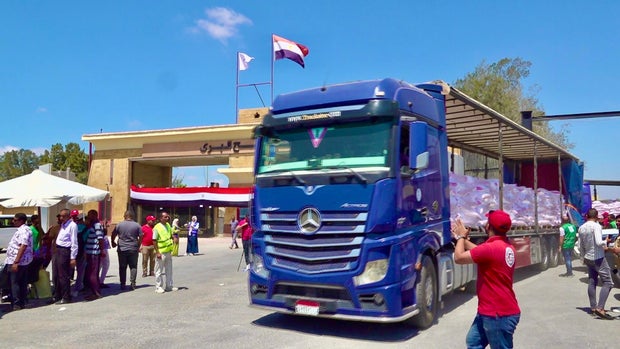Cairo — The British Embassy in Cairo said Sunday that it had temporarily closed its main building after Egyptian authorities removed concrete security barriers from around the compound’s exterior perimeter. The barriers had been there for decades as a security measure.
“The main Embassy building is temporarily closed while we review the impact of works undertaken by the Egyptian authorities in the vicinity,” a U.K. Foreign Office spokesperson told CBS News in a statement on Monday, noting that the embassy remained in operation and only the primary building was closed.
There was no official comment from the Egyptian government about the removal of the barriers outside the U.K. embassy, but the move came amid escalating diplomatic tension between Egypt and several countries over protests targeting Egyptian missions abroad, including in the Netherlands, Austria, France, Turkey, the U.K., Canada, the U.S, and in Israel.
WAHAJ BANI MOUFLEH/Middle East Images/AFP/Getty
In recent months, pro-Palestinian demonstrators have chained the doors of Egyptian embassies and consulates closed from the outside and spray-painted slogans on their walls, mostly demanding the opening of the Rafah crossing between northeast Egypt and the war-torn Gaza Strip.
Egyptian officials have said their side of the Rafah crossing has remained open since the Gaza war erupted almost two years ago, while the Israeli military controls the Palestinian side and how much aid is allowed in, and how many people are allowed out.
The Egyptian authorities have argued that the protests are not random nor peaceful, but rather organized attacks against the country, and they have accused European host governments of failing to protect their staff and diplomatic premises from vandalism.
CBS News/Ahmed Shawkat
Foreign Minister Badr Abdelatty was heard in a video circulated online suggesting Egypt could take reciprocal action, saying: “If their governments won’t provide adequate security for our missions, then we should reconsider our own deployments.”
In a few cases, activists who back the Egyptian government have taken matters into their own hands and gathered outside embassies in European capitals, declaring that they were there to protect the facilities.
Most of these activists have identified themselves as members of the so-called “Union of Egyptian Youth Abroad.”
The self-described leader of that group, Ahmed Abdel Qader, was detained in London last week by British police. According to Egypt’s Ministry of Foreign Affairs, Foreign Minister Badr Abdelatty raised the case in an Aug. 26 phone call with U.K. National Security Adviser Jonathan Powell.
In a statement published online that day by the Egyptian government, the foreign ministry said it was following his detention “with great concern” and had requested urgent clarification of the circumstances surrounding the arrest, stressing Egypt expected his “prompt release.”
Social media videos show the activist was released after being detained, and there were no charges announced. London’s Metropolitan Police told CBS News it could not immediately offer any information on the circumstances of the Egyptian national’s detention or his subsequent release.
Amid the dispute, a relatively new political party in Egypt, the National Front Party, issued a lengthy statement declaring solidarity with the foreign ministry and condemning the activist’s detention in London.
“We will not protect those who do not protect us,” the party, which was founded in December, declared in its Aug. 26 statement. It condemned the detention of “one of Egypt’s loyal sons” as a “blatant violation of justice, human rights, and the rules of diplomatic relations.”
The party called on the government to reconsider the privileges granted to British diplomatic missions in Cairo. It specifically pointed to the U.K. Embassy in the affluent, heavily fortified Garden City neighborhood where the U.S. and other embassies are also located.
The party argued that the British facility’s concrete barriers and other security measures had turned the area into “a closed-off zone” and disrupted residents’ lives, and it demanded that the barriers be removed.
CBS News’ Ciara Moran and Lindsay Quella in London contributed to this report.

